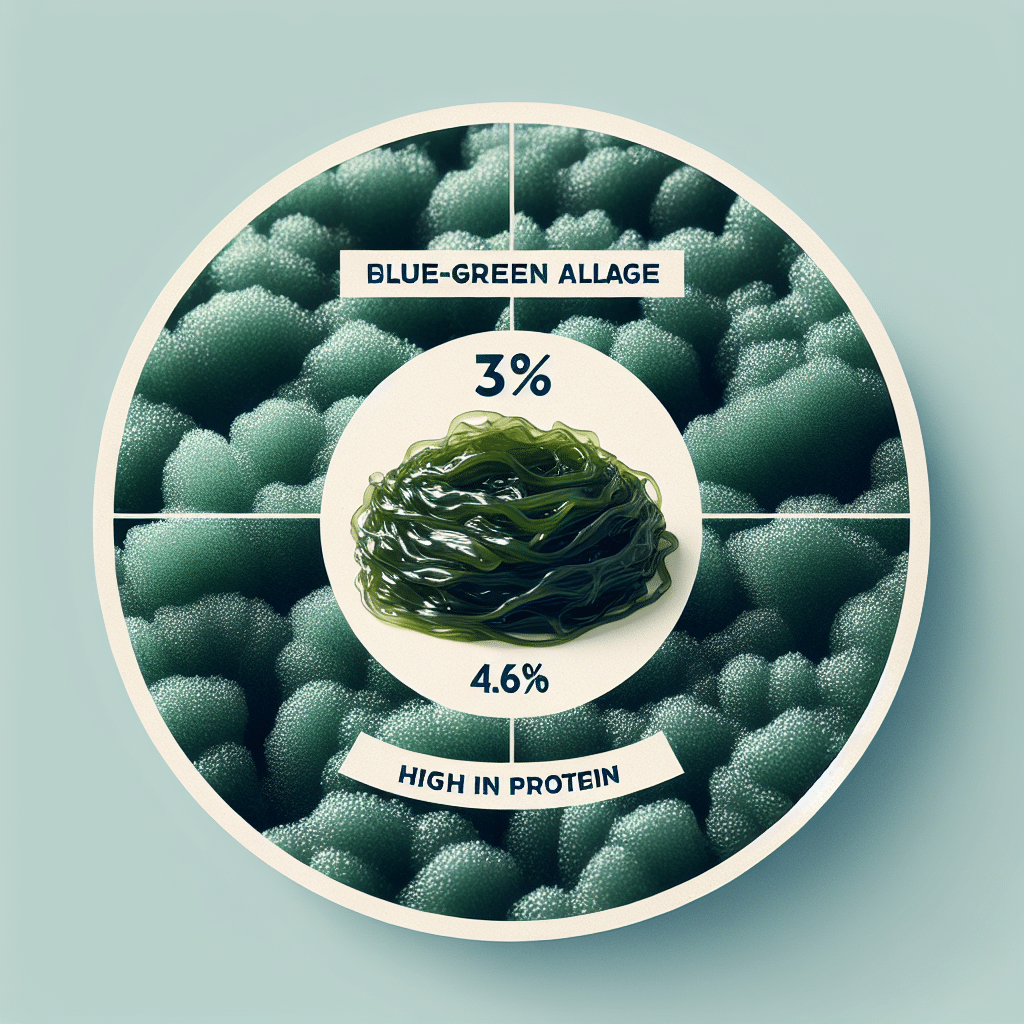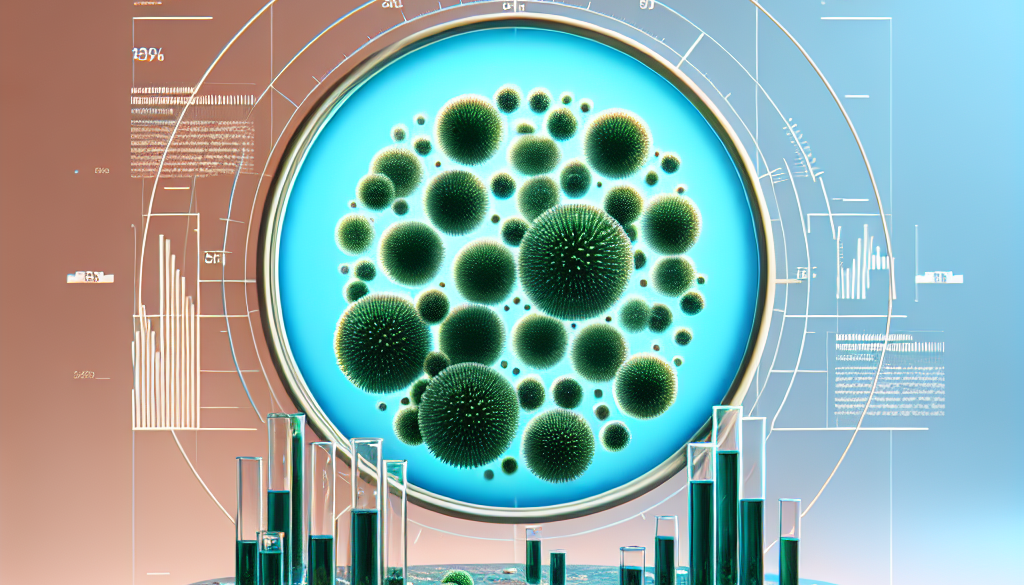Is Blue-Green Algae High In Protein?
-
Table of Contents
Blue-Green Algae: A High-Protein Superfood?

Blue-green algae, often referred to as cyanobacteria, are microscopic organisms found in freshwater and marine systems. They have gained popularity as a dietary supplement due to their potential health benefits, including a high protein content. This article delves into the nutritional profile of blue-green algae, focusing on its protein content, and explores whether it can be considered a high-protein superfood.
Understanding Blue-Green Algae
Blue-green algae are not true algae but a type of bacteria that have characteristics similar to algae. They are capable of photosynthesis and can produce their own food from sunlight. There are various species of blue-green algae, with Spirulina and Aphanizomenon flos-aquae (AFA) being the most commonly consumed by humans.
Protein Content in Blue-Green Algae
One of the most touted benefits of blue-green algae is its protein content. Protein is an essential macronutrient required for building and repairing tissues, making enzymes and hormones, and supporting immune function. But how does blue-green algae compare to other protein sources?
- Spirulina: This species of blue-green algae is composed of about 60-70% protein by dry weight, which is significantly higher than most plant and animal sources. For example, beef contains about 25-30% protein, and cooked soybeans have about 16% protein.
- AFA: While not as extensively studied as Spirulina, AFA also boasts a high protein content, with reports suggesting it can contain up to 60% protein by dry weight.
Moreover, the protein in blue-green algae is considered a complete protein, meaning it contains all nine essential amino acids that the body cannot produce on its own. This is particularly beneficial for vegetarians and vegans who may struggle to obtain complete proteins from plant-based sources.
Nutritional Benefits Beyond Protein
Aside from its impressive protein content, blue-green algae offer a range of other nutrients:
- Antioxidants: Blue-green algae contain various antioxidants, which can help protect cells from damage caused by free radicals.
- Vitamins and Minerals: They are rich in vitamins B1, B2, B3, B6, B9, and B12, as well as minerals like iron, magnesium, potassium, and calcium.
- Essential Fatty Acids: Blue-green algae are a source of gamma-linolenic acid (GLA), an omega-6 fatty acid that has anti-inflammatory properties.
- Phycocyanin: This pigment found in Spirulina has been studied for its potential anti-inflammatory and antioxidant effects.
Case Studies and Research
Several studies have highlighted the potential health benefits of blue-green algae. For instance, research has shown that Spirulina supplementation can improve muscle strength and endurance, likely due to its high protein and antioxidant content. Another study found that Spirulina could help improve anemia in older adults, thanks to its high iron content.
However, it’s important to note that while research is promising, more extensive and long-term studies are needed to fully understand the health impacts of blue-green algae consumption.
Considerations and Potential Risks
While blue-green algae can be a nutritious addition to the diet, there are some considerations to keep in mind:
- Quality and Purity: Some blue-green algae products may be contaminated with toxins, such as microcystins, which can be harmful to health. It’s crucial to choose supplements from reputable sources that test for contaminants.
- Dietary Balance: Although blue-green algae are high in protein, they should not be the sole protein source in one’s diet. A balanced diet with a variety of protein sources is essential for overall health.
- Medical Conditions: Individuals with certain medical conditions, such as phenylketonuria (PKU), should avoid blue-green algae due to its phenylalanine content.
Conclusion: A Protein Powerhouse?
In conclusion, blue-green algae, particularly Spirulina and AFA, are indeed high in protein and offer a complete amino acid profile. They also provide a host of other nutrients that can contribute to a healthy diet. However, consumers should be mindful of the source of their blue-green algae supplements to avoid potential contaminants.
The key takeaways from this article are the exceptional protein content of blue-green algae, its status as a complete protein source, and the additional health benefits it may offer. As with any supplement, it should be used to complement a balanced diet and not as a replacement for other protein sources.
Discover ETprotein’s High-Quality Protein Products
If you’re looking for high-quality protein supplements, consider ETprotein’s range of organic bulk vegan proteins. Their products, including organic rice protein, pea protein, and various seed proteins, are characterized by a neutral taste, non-GMO, and allergen-free attributes. With L-(+)-Ergothioneine purity over 98%, ETprotein caters to a diverse range of industries and dietary needs.
About ETprotein:
ETprotein, a reputable protein and L-(+)-Ergothioneine (EGT) Chinese factory manufacturer and supplier, is renowned for producing, stocking, exporting, and delivering the highest quality organic bulk vegan proteins and L-(+)-Ergothioneine. They include Organic rice protein, clear rice protein, pea protein, clear pea protein, watermelon seed protein, pumpkin seed protein, sunflower seed protein, mung bean protein, peanut protein, and L-(+)-Ergothioneine EGT Pharmaceutical grade, L-(+)-Ergothioneine EGT food grade, L-(+)-Ergothioneine EGT cosmetic grade, L-(+)-Ergothioneine EGT reference grade and L-(+)-Ergothioneine EGT standard. Their offerings, characterized by a neutral taste, non-GMO, allergen-free attributes, with L-(+)-Ergothioneine purity over 98%, 99%, cater to a diverse range of industries. They serve nutraceutical, pharmaceutical, cosmeceutical, veterinary, as well as food and beverage finished product distributors, traders, and manufacturers across Europe, USA, Canada, Australia, Thailand, Japan, Korea, Brazil, and Chile, among others.
ETprotein specialization includes exporting and delivering tailor-made protein powder and finished nutritional supplements. Their extensive product range covers sectors like Food and Beverage, Sports Nutrition, Weight Management, Dietary Supplements, Health and Wellness Products, and Infant Formula, ensuring comprehensive solutions to meet all your protein needs.
As a trusted company by leading global food and beverage brands and Fortune 500 companies, ETprotein reinforces China’s reputation in the global arena. For more information or to sample their products, please contact them and email sales(at)ETprotein.com today.












